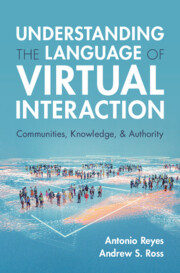Book contents
- Understanding the Language of Virtual Interaction
- Understanding the Language of Virtual Interaction
- Copyright page
- Contents
- Figures
- Tables
- 1 Introduction
- 2 Web 2, a Digital Revolution?
- 3 Digital Communication and the “Post-Truth” Era
- 4 The Formation of Virtual Communities
- 5 The Negotiation of Meaning, Knowledge, and Authority Online
- 6 (De)Legitimization of Authority in Digital Communication
- 7 Competition with Official Institutions
- 8 Politics and Participation in the Digital Public Sphere
- 9 Human Rights and Social Change in Virtual Spaces
- 10 Discourse and Identity in a Lawless Digital Universe
- 11 Conclusion
- References
- Index
11 - Conclusion
Published online by Cambridge University Press: 05 September 2025
- Understanding the Language of Virtual Interaction
- Understanding the Language of Virtual Interaction
- Copyright page
- Contents
- Figures
- Tables
- 1 Introduction
- 2 Web 2, a Digital Revolution?
- 3 Digital Communication and the “Post-Truth” Era
- 4 The Formation of Virtual Communities
- 5 The Negotiation of Meaning, Knowledge, and Authority Online
- 6 (De)Legitimization of Authority in Digital Communication
- 7 Competition with Official Institutions
- 8 Politics and Participation in the Digital Public Sphere
- 9 Human Rights and Social Change in Virtual Spaces
- 10 Discourse and Identity in a Lawless Digital Universe
- 11 Conclusion
- References
- Index
Summary
This chapter summarizes the key conclusions of the book, which examines how the Internet has transformed human interaction by fostering virtual communities and reshaping knowledge, authority, and legitimacy. Through an analysis of discursive practices in digital spaces, the book reveals how democratic participation online challenges traditional institutions and disrupts established knowledge hierarchies. Central to this inquiry is the tension between increased access to information and the erosion of institutional trust, exemplified by case studies such as the Spanish Royal Academy (RAE) and the COVID-19 ‘infodemic.’ The book further investigates misinformation, political communication through memes, and the rise of online activism, showing how digital communities shape discourse and build connective identities. Critical issues such as online human rights, free speech, and legal regulation are explored, with a particular focus on the metaverse and digital vigilantism. By addressing these complex dynamics, the book highlights the evolving challenges and opportunities of online discourse and stresses the importance of ongoing research as society adapts to the rapidly changing digital landscape, including innovations in Generative AI.
Keywords
Information
- Type
- Chapter
- Information
- Understanding the Language of Virtual InteractionCommunities, Knowledge, and Authority, pp. 170 - 173Publisher: Cambridge University PressPrint publication year: 2025
Accessibility standard: WCAG 2.2 AAA
Why this information is here
This section outlines the accessibility features of this content - including support for screen readers, full keyboard navigation and high-contrast display options. This may not be relevant for you.Accessibility Information
Content Navigation
Allows you to navigate directly to chapters, sections, or non‐text items through a linked table of contents, reducing the need for extensive scrolling.
Provides an interactive index, letting you go straight to where a term or subject appears in the text without manual searching.
Reading Order & Textual Equivalents
You will encounter all content (including footnotes, captions, etc.) in a clear, sequential flow, making it easier to follow with assistive tools like screen readers.
You get concise descriptions (for images, charts, or media clips), ensuring you do not miss crucial information when visual or audio elements are not accessible.
You get more than just short alt text: you have comprehensive text equivalents, transcripts, captions, or audio descriptions for substantial non‐text content, which is especially helpful for complex visuals or multimedia.
Visual Accessibility
You will still understand key ideas or prompts without relying solely on colour, which is especially helpful if you have colour vision deficiencies.
You benefit from high‐contrast text, which improves legibility if you have low vision or if you are reading in less‐than‐ideal lighting conditions.
